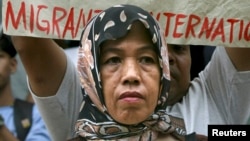Migrant domestic workers in the United Arab Emirates (UAE) are beaten, exploited, and trapped in forced labor situations, according to a Human Rights Watch (HRW) report published Thursday. Analysts say that across the Middle East, living conditions for migrant domestic workers, most of them from Asia and Africa, are very poor.
Marelie Brua from the Philippines once was a domestic worker in the United Arab Emirates.
She said she complained one time to her “Madame” that there was no food for her to eat. And she was told: “You are just something I bought. So don’t complain. You do not have the right to complain because we bought you.”
Human rights violations
The Human Rights Watch report published Thursday documents widespread abuse of immigrant domestic workers in the UAE. The majority are from Africa and Asia.
Rothna Begum from HRW said many of the women who migrate to UAE do not know what is in store for them.
“Tens of thousands of women every single year migrate to the United Arab Emirates. They say goodbye to their families and their very young children. They hope they will be securing salaries for their families’ futures. But they have no guarantee that they will end up with such salaries or good working conditions,” said Begum.
Domestic workers who were interviewed for the report described not being paid, not having rest periods or time off, being confined in their employer’s homes, and working days of up to 21 hours.
They described being deprived of food and reported psychological, physical, and sexual abuse. Many said their employers treated them like animals.
Visa sponsorship system
HRW says the domestic workers’ rights will not improve until the UAE’s visa sponsorship system, known as kafala, changes.
The system requires all unskilled workers to have a sponsor within the UAE who is responsible for their visa and legal status.
Begum said that means workers cannot move to a new job before their contracts end without the employer’s consent, trapping workers in abusive conditions.
“They are not allowed to transfer employers even if they are being abused or receiving far less than they were promised, they are trapped to that single employer,” said Begum.
Audrey Guichon from Anti-Slavery International said responsibility for protecting the migrant workers does not lie solely with the host country. She said labor-sending countries need to do more to protect the workers against deceptive recruitment practices, and to educate their populations about the possible conditions overseas.
Abused workers
She said the conditions for domestic workers in the Middle East are perhaps the worst in the world, but in every region of the world domestic workers may suffer abuse.
For a long time domestic work was not considered a profession, she said, and so workers have not had adequate legal protection.
“This led to creating a very weak framework of protection for them where they are not recognized in the labor laws, so don’t benefit from the kind of protection that any other workers, or most other sectors, would benefit from,” said Guichon.
According to HRW, at least 146,000 female migrant domestic workers from countries such as the Philippines, Indonesia, India, Bangladesh, Sri Lanka, Nepal, and Ethiopia work in the UAE.




